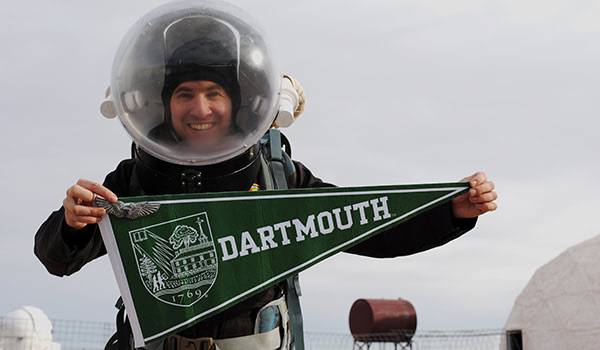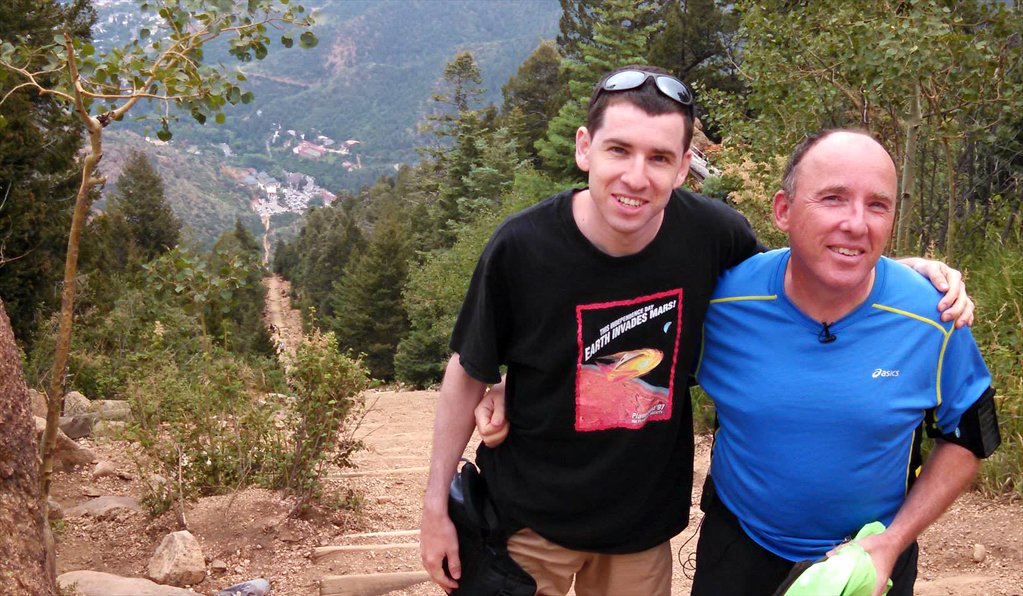- Undergraduate
Bachelor's Degrees
Bachelor of ArtsBachelor of EngineeringDual-Degree ProgramUndergraduate AdmissionsUndergraduate Experience
- Graduate
Graduate Experience
- Research
- Entrepreneurship
- Community
- About
-
Search
All Thayer News
Alumni Portrait: Max Fagin Th'11
Feb 18, 2019 | by Kristen Senz
Aerospace Engineer

Fagin served as crew commander at the Mars Desert Research Center in Utah earlier this year.
Max Fagin doesn’t remember when space travel became the defining goal for his life.
“Whatever it was that inspired me to get into space happened before I was laying down memories,” the Silicon Valley-based aerospace engineer said during a recent phone conversation. “It’s always been a part of me.”
Fagin currently designs hardware for the International Space Station and other customers as part of the team at Made In Space, a manufacturing company that aims to leverage the unique space environment to develop commercial solutions across a variety of industries. For the past two years, Fagin has been working on Archinaut, a robot spacecraft capable of assembling solar arrays, support structures, and other components in Earth orbit. Fagin hopes that by the time of Archinaut’s scheduled launch in 2020, he will have found his own ticket to get beyond Earth’s orbit to the Red Planet.
“My future goal is and remains getting to Mars in some way, shape, or form,” says Fagin. “Mars is the most relevant destination for humans in the solar system. It’s the only place in our solar system other than Earth that has the resources to support an independent branch of humanity.”
For now, Fagin’s focus as an aerospace engineer is on improving methods for developing and building new technology in space that he and other Mars explorers might eventually deploy to more effectively live and study there. In space, Fagin explains, it is possible to build more powerful fiber optics and telescopes, due to the zero gravity environment, enabling researchers to expand the search for intelligent life and the exploration of Mars for potential colonization.
“It’s so important for us to colonize in general because, as a life form, it is necessary for us to ensure that our species has a future. The inevitable conclusion of looking at life on this planet is that life forms that remain in their niche and become stagnant in their niche are destined for extinction,” he says. “Single-planet species are exposed to a wide range of risks, from asteroid strikes to eventually the sun dying out, and the only way to mitigate these risks is to become an interstellar species.”
Born in New Hampshire and raised in Colorado, Fagin received a BE degree at Thayer School in 2011 after participating in the dual degree program with Vassar College. His senior design team at Thayer developed a component for a life support system that could dehumidify the air astronauts breathe in space without moving parts or gravity. The work earned him his first weightless experience, when the team brought their prototype to NASA’s Johnson Space Center for testing. “It felt very natural,” he says. “It was very easy to move around.”
Fagin stayed in Hanover for an extra year to serve as a design fellow in the Thayer Machine Shop, where he worked closely with shop director Kevin Baron. “I owe a lot to Kevin,” he says. “He taught me some of the most useful skills I have as an engineer.”
In 2015, Fagin received a master’s degree in aeronautics and astronautics from Purdue University. He has twice visited Mars Desert Research Station in Utah, most recently as crew commander from December 2017 to January 2018.
In his spare time, Fagin enjoys hiking and skiing—“the usual Dartmouth stuff.” He also likes kite surfing and general aviation. He earned a pilot’s license while at Purdue and has spent some memorable weekends in Tahoe with fellow Dartmouth alumni at a College-owned cabin there.

Fagin climbs Pikes Peak with his father, former Thayer professor Barry Fagin, in 2014.
During his undergraduate years, Fagin was involved in theater as a stage actor. In fact, he credits acting with helping him to become the successful engineer he is today, enabling him to hone his creativity and communication skills.
“There is definitely a lot of overlap between engineering and theater skills, and a lot of people give me a quixotic look when I say that,” he says. “But theater is a route toward the emotional intelligence that some engineers have a problem with, and engineering is a team-based endeavor, so the team-based skills you learn in engineering are very applicable to theater.”
These days, though, Fagin is more focused on finding a way to land on Mars than on landing new dramatic roles. He is currently working toward acceptance in the NASA Astronaut Corps, which admits a new class every three years. In late 2013, while still in graduate school, he was shortlisted in the search for 24 people to colonize Mars through the Mars One Program. Although he wasn’t ultimately selected, and the program found funds to be lacking, he decided then that he was going to Mars, even if it meant never coming back.
“I’m not interested to go to Mars to die, but I am interested in dying on Mars, as long as that death is of natural causes with a significant amount of work on Mars behind me,” he says. “If I can end my life and career on Mars, having done some of the initial work on terraforming, I can’t think of anything more satisfying to build a life on.”
Terraforming is the process of modifying the thin Mars atmosphere to make it more Earth-like. Heating up the planet’s surface would theoretically release more carbon dioxide and water vapor, creating a denser atmosphere and a water cycle. If successful, humans could live near the planet’s poles. They would still need oxygen tanks to breathe, but not space suits. “We’ve understood how to do this on Mars for decades,” says Fagin. “On paper, it is a fairly simple process.”
In reality, blasting off for Mars is still years away, but people like Elon Musk of SpaceX, where Fagin was an intern, and others are working to make it happen in Fagin’s lifetime, and he is not afraid to be one of the first to take the ride.
“Fear is a product of uncertainty, and the uncertainties that exist in traveling to Mars are all the kind that can be designed or engineered around with the correct amount of engineering know-how,” says Fagin. “I’m convinced that all the problems can be solved, so there’s really no reason to be scared.”
And Fagin hasn’t fully given up on performing on stage as an actor, either. He’s just waiting for space to open up in his schedule. “Maybe once I get to Mars, there will be more time.”
For contacts and other media information visit our Media Resources page.
